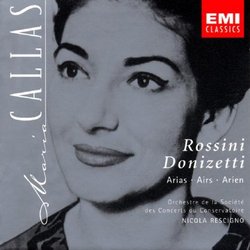| All Artists: Gaetano Donizetti, Gioachino Rossini, Nicola Rescigno, Monte Carlo Conservatory Concert Society Orchestra, Maria Callas Title: Rossini & Donizetti: Arias Members Wishing: 0 Total Copies: 0 Label: EMI Import Original Release Date: 1/1/1964 Re-Release Date: 1/20/1998 Album Type: Import Genre: Classical Styles: Opera & Classical Vocal, Historical Periods, Modern, 20th, & 21st Century Number of Discs: 1 SwapaCD Credits: 1 UPC: 724356646421 |
Search - Gaetano Donizetti, Gioachino Rossini, Nicola Rescigno :: Rossini & Donizetti: Arias
 | Gaetano Donizetti, Gioachino Rossini, Nicola Rescigno Rossini & Donizetti: Arias Genre: Classical
|
Larger Image |
CD Details |
CD ReviewsMuch better than I was led to believe Vicki J. Kondelik | 10/27/1999 (5 out of 5 stars) "A lot of people, including the previous reviewer, have said that this is Callas' worst recital. I don't really know why. I'm not an expert, so I can't comment on the technical aspects of her voice; I just know that it sounds good to me! I think it is interesting to listen to Callas in arias from operas that were not part of her repertoire. The arias from Daughter of the Regiment and Elixir of Love were fascinating; they made me wish Callas had sung or recorded the comic Donizetti operas." AN UNFORTUNATE RECITAL lesismore26 | Chicago, Illinois USA | 06/27/1999 (2 out of 5 stars) "I've always considered this 1963 Callas recital to be the least successful of the whole batch. It's not just the condition of the voice (which had begun to seriously deteriorate since around 1960), but the particular music that Callas elected to record on this occasion, music that might not have engaged her imagination even five or ten years earlier in the years of her vocal prime. Of the Rossini items, only the "Selve Opaca" from "William Tell" (not a vocally difficult piece to begin with) finds Callas making real headway vocally and musically. She glides nicely over the music, sings the words quite meaningfully, and contrives some nice piano notes on the A flats. From here it's all downhill: the wonderful "Cenerentola" rondo is dour and lifeless in the extreme ---- Callas' voice sounds much too mature in this music; the "Semiramide" aria "Bel Raggio" is too morbid and dreary. Of the Donizetti arias, the "Lucrezia Borgia" aria is sung without the rousing cabaletta at the end, which would have enlivened the procedings considerably; the two arias from "L'Elisir d'Amore" and "Figlia de Reggimento" would never have suited the Callas personallity to begin with, and here the much too-mature sound of her voice is all wrong for these ingenues. And then there are the problems of the Callas voice, which at this time found comfort only in the most minimal options in bel canto music. Any note above the staff was risky business, which put just about everything she sang at that time on very shaky ground. Yes, the voice still can do some interesting things: the scales in the finale of the "Cenerentola" rondo are still amazingly nimble (until she has to sustain the final top B!) and the passagework in the cabaletta of the "Semiramide" is noble and compelling, although she seems to momentarily lose her place in the final chain of notes of the cadenza before ending on a somewhat frayed top B flat. This recording, while nowhere near the best of Callas, may be of great interest to her many fans and followers. More importantly, the "Cenerentola" and "Semiramide" arias DO illustrate that Callas' ability to negotiate almost textbook-perfect descending passagework was still intact at a time when her actual voice was a mere shadow of it's former self."
|

 Track Listings (6) - Disc #1
Track Listings (6) - Disc #1